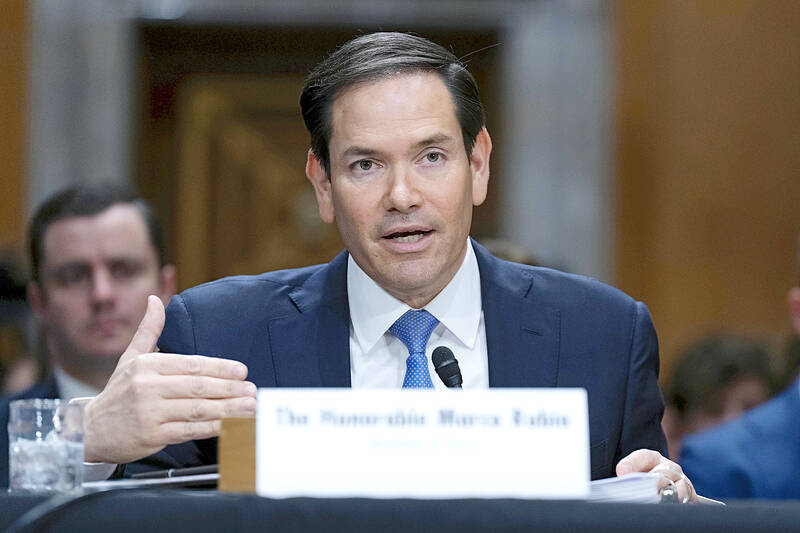Deterring a conflict initiated by China over Taiwan requires making the cost “more than what it’s worth” for Beijing, US Secretary of State Marco Rubio said at a US Senate Foreign Relations Committee hearing on Tuesday.
Rubio made the remark in response to a question from US Senator John Cornyn, who warned that Chinese President Xi Jinping (習近平) has instructed the People’s Liberation Army to “be ready to take Taiwan” by 2027.
“In essence, it has to cost more than what it’s worth,” Rubio said.

Photo: AP
“Deterrence is the key,” he said, adding that “deterrence obviously begins with Taiwan’s own self-defense capabilities.”
“The harder they are to take militarily, the more time I think they buy for themselves,” he said.
He called for “a credible regional deterrent” involving Japan and other allied nations, and said European allies were showing greater interest in the Indo-Pacific region.
He added that at a NATO foreign ministers gathering in Turkey last week, several member states raised concerns about how a potential conflict in the region could affect Europe.
Cornyn also voiced concern that the US and its allies might not be adequately prepared for a conflict with China over Taiwan.
Rubio, who officially serves as the principal adviser to US President Donald Trump on all foreign affairs matters, said that when the US responds to conflicts in Europe or the Middle East, resources are pulled from the Indo-Pacific region.
“We would like to be able to do all things everywhere, but the fact of the matter is there are finite resources and there’s only 24 hours in every day,” Rubio said.
At a US Senate Appropriations Committee hearing later the same day, US Senator Lindsey Graham asked if the way the US “ends the war in Ukraine with Russia” could affect China’s calculus on Taiwan.
“I think the way we end the war [in Ukraine] could impact how China views it,” Rubio replied, without elaborating.

Eight restaurants in Taiwan yesterday secured a one-star rating from the Michelin Guide Taiwan for the first time, while three one-star restaurants from last year’s edition were promoted to two stars. Forty-three restaurants were awarded one star this year, including 34 in Taipei, five in Taichung and four in Kaohsiung. Hosu (好嶼), Chuan Ya (川雅), Sushi Kajin (鮨嘉仁), aMaze (心宴), La Vie by Thomas Buhner, Yuan Yi (元一) and Frassi in Taipei and Front House (方蒔) in Kaohsiung received a one-star rating for the first time. Hosu is known for innovative Taiwanese dishes, while Chuan Ya serves Sichuan cuisine and aMaze specializes

Taitung County is to launch charter flights to Malaysia at the end of this year, after setting up flights to Vietnam and Thailand, the Taitung County Government said yesterday. The new charter flight services, provided by low-cost carrier Batik Air Malaysia, would be part of five-day tour packages for visits to Taitung County or Malaysia. The Batik Air charter flight, with about 200 seats, would take Malaysian tourists to Taitung on Dec. 30 and then at 12:35pm return to Kuala Lumpur with Taiwanese tourists. Another charter flight would bring the Taiwanese home on Jan. 3 next year, arriving at 5:30pm, before taking the

Taiwan High Speed Rail Corp. (THSRC) plans to ease strained capacity during peak hours by introducing new fare rules restricting passengers traveling without reserved seats in 2026, company Chairman Shih Che (史哲) said Wednesday. THSRC needs to tackle its capacity issue because there have been several occasions where passengers holding tickets with reserved seats did not make it onto their train in stations packed with individuals traveling without a reserved seat, Shih told reporters in a joint interview in Taipei. Non-reserved seats allow travelers maximum flexibility, but it has led to issues relating to quality of service and safety concerns, especially during

STATS: Taiwan’s average life expectancy of 80.77 years was lower than that of Japan, Singapore and South Korea, but higher than in China, Malaysia and Indonesia Taiwan’s average life expectancy last year increased to 80.77 years, but was still not back to its pre-COVID-19 pandemic peak of 81.32 years in 2020, the Ministry of the Interior said yesterday. The average life expectancy last year increased the 0.54 years from 2023, the ministry said in a statement. For men and women, the average life expectancy last year was 77.42 years and 84.30 years respectively, up 0.48 years and 0.56 years from the previous year. Taiwan’s average life expectancy peaked at 81.32 years in 2020, as the nation was relatively unaffected by the pandemic that year. The metric